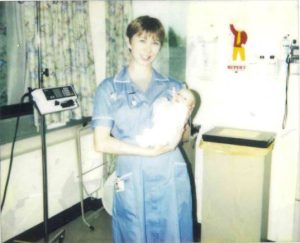
Wendy Pedley’s journey to her true calling as a compassionate and dedicated NHS nurse has been filled with determination and a passion for making a difference in people’s lives.
Growing up in Yorkshire, Wendy left school at 17 without formal qualifications, and initially pursued various jobs in hospitality and even worked as a holiday rep overseas.
However, her life’s purpose took a significant turn when she found herself drawn to a career centred on helping and supporting others in the NHS.
“My mum was a nurse and she often suggested I should be one too, but I never really wanted that. I was quite rebellious as a teenager, and the timing wasn’t right,” said Wendy.
Supporting others
As a child, Wendy witnessed her mother’s mental health struggles – which included periods of depression resulting in her parent’s hospitalisation.
Indeed, it was as she tried to process her experiences in later years, that she found herself gravitating towards a whole new career centred on helping and supporting other people.
“I was about 30 by this time, had a young child and no official qualifications. I volunteered as a listener for the Samaritans,” she said.
“After that I did a counselling course, which enabled me to support people with drug and alcohol problems, then got a job as a nursing auxiliary at The Friarage Hospital in Northallerton.”
Hard work and dedication
Wendy had aspirations of becoming a registered adult nurse but, due to her lack of exams, needed to pass Level 2 and 3 NVQ qualifications at the same time as being a working mother.
She then started her adult nursing studies in 1995 but, after completing a mental health placement on an acute ward, asked to switch courses to become a mental health nurse instead.
“I just knew, as soon as my first shift was finished, that this was my chosen career,” she said. “Even though I’d enjoyed my time in paediatrics, surgery and medical, this was what I wanted to do.
“It matched what I had done with the Samaritans, and as a support worker. It seemed to fit my skillset and just felt right. I qualified with a diploma, and then topped it up with a degree.”
Finding a good fit for a career
Wendy spent four years on an acute mental health ward after qualifying, before retraining as a health visitor at Durham University – due to her interest in perinatal mental health.
She then spent almost five years based in Catterick Garrison, supporting both civilians and army families, but eventually found herself missing working in mental health on a daily basis.
“I’ve enjoyed everything I’ve done and every job that I have had. I’m glad I’ve experienced it all. But I really did miss working in fulltime mental health care,” she said.
An application to Tees, Esk and Wear Valleys NHS Foundation Trust (TEWV) proved successful, and she started work as a perinatal co-ordinator at St Luke’s in Middlesbrough in 2006.
During her two years at the hospital Wendy passed a Masters degree in Advancing Practice, before moving on to become a team leader in substance misuse services in North Yorkshire.
“I’m not academic – but I’m a hard worker – and I’ve found the academic work supports the clinical interventions by giving you the evidence base you need,” she said.
“I’d tell anybody that if an opportunity presents itself, and that it is interesting to you, you will find it easier to learn the more academic components of a course.”
Continued learning
In the past few years Wendy has worked as a crisis clinician, care coordinator and volunteered as a staff governor for the Trust.
She also works as a CQC specialist advisor nationwide and is part of the working party of a Trust project to support staff who are carers.
Her special interests include dual diagnosis – a co-existing mental disorder and a drug or alcohol problem – and also works as a link professional for the Trust for safe-guarding children.
She has also completed a post-graduate diploma in Advanced Clinical Practice at York University and is currently an advanced clinical practitioner in the North Yorkshire locality.
Enduring passion for NHS
“My passion is about being socially inclusive and I’ve done that all my working life. I always set very high standards for myself and expect staff to treat patients as if they are their family.
“The NHS has not only looked after me and my family, but also given me a career with education and training. I’m proud to work for the NHS and celebrate its anniversary.”